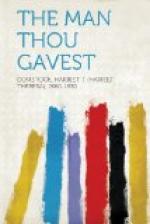It was something of a shock to him one evening, nearly three years after his visit to Pine Cone, to find himself looking at Lynda Kendall as if he had never seen her before.
She was going out with Brace and was in evening dress. Truedale had never seen her gowned so, and he realized that she was extremely handsome and—something more. She came close to him, drawing on her long, loose, white gloves.
“I cannot bear to go and leave you—all alone!” she said, raising her eyes to his.
“You see, John Morrell is showing us his brand-new wife to-night—and I couldn’t resist; but I’ll try to break away early.”
“You are eager to see—Mrs. Morrell?” Truedale asked, and suddenly recalled the relation Lynda had once held to Morrell. He had not thought of it for many a day.
“Very. You see I hope to be great friends with her. I want—”
“What, Lynda?”
“Well, to help her understand—John.”
“Let me button your glove, Lyn”—for Truedale saw her hands were trembling though her eyes were peaceful and happy. And then as the long, slim hand rested in his, he asked:
“And you—have never regretted, Lyn?”
“Regretted? Does a woman regret when she’s saved from a mistake and gets off scot-free as well?”
They looked at each other for a moment and then Lynda drew away her hand.
“Thanks, Con, and please miss us a little, but not too much. What will you do to pass the time until we return?”
“I think”—Truedale pulled himself up sharply—“I think I’ll go up under the eaves and get out—the old play!”
“Oh! how splendid! And you will—let me hear it—some day, soon?”
“Yes. Business is going easier now. I can think of it without neglecting better things. Good-night, Lyn. Tuck your coat up close, the night’s bad.”
And then, alone in the warm, bright room, Truedale had a distinct sense of Lynda having taken something besides herself away. She had left the room hideously lonely; it became unbearable to remain there and, like a boy, Conning ran up to the small room next the roof.
He took the old play out—he had not unpacked it since he came from Pine Cone! He laid it before him and presently became absorbed in reading it from the beginning. It was after eleven when he raised his tired eyes from the pages and leaned back in his chair.
“I’m like—all men!” he muttered. “All men—and I thought things had gone deeper with me.”
What he was recognizing was that the play and the subtle influence that Nella-Rose had had upon him had both lost their terrific hold. He could contemplate the past without the sickening sense of wrong and shock that had once overpowered him. Realizing the full meaning of all that had gone into his past experience, he found himself thinking of Lynda as she had looked a few hours before. He resented the lesser hold the past still had upon him—he wanted to shake it free. Not bitterly—not with contempt—but, he argued, why should his life be shadowed always by a mistake, cruel and unpardonable as it was, when she, that little ignorant partner in the wrong, had gone her way and had doubtless by now put him forever from her mind?




